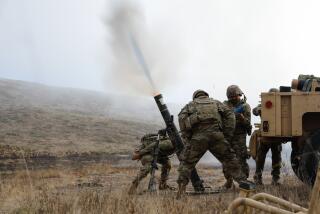Youths Get a Look at Job Prospects on the Flight Line : Education: A week at Point Mugu air station exposes students to career opportunities in aerospace.
Buzzing the runway Monday at Point Mugu Naval Air Weapons Station, two low-flying F/A-18 Hornets spooked a group of teen-agers, but not their gung-ho tour guide.
“Doesn’t that look like fun?” Capt. Andrew Phillips asked after the thundering jets streaked away. “If you think Disneyland has exciting rides, try barrel roles at Mach 2. You can’t believe how much fun it is. And they pay you to do it.”
Phillips was trying to sell a Navy career to the 20 underprivileged teen-agers spending the week at the base in a program sponsored by the Federal Aviation Administration and funded by the Job Training Policy Council of Ventura County.
Paid $4.25 an hour to take part in the program, the teen-agers, all from Ventura, are seeing the wide variety of military and civilian jobs available at the base and meeting the professionals who staff them.
“The idea of the program is for the kids to find out about different fields,” said Angel Silva, a counselor with the county superintendent of schools, which operates the program.
Although the program is not intended as a recruiting tool for the Navy, it is run with military precision and provides the teen-agers with a taste of life on a military base.
“I never liked the military,” said Aaron Flores, 14, “but this is cool.”
After getting up-close and personal with the F/A-18s, the teen-agers learned about aircraft maintenance--and destruction. Sitting in on an “unclassified briefing,” they watched a short video showing missiles destroying various targets off the Ventura County coast.
“How come nobody’s going ooh and aah ?” Phillips asked after a Tomahawk missile blew up a ship.
“Isn’t wrecking that ship a waste of money?” a teen-ager asked.
Target safety officer Art McHarg laughed. “Everybody asks that question,” he said. “Actually, that ship is an old hulk. If we didn’t sink it, it would just be cut up for razor blades.”
The cockpit of a Vietnam-era F-4 Phantom jet was more inspiring for the teen-agers. Paul Kronick, 14, peered into the compact chamber and inspected the complex array of gauges and switches.
“I’ve seen a lot of war movies and understand how these planes work,” Paul said. “I don’t see why I can’t be someone who flies them one of these days.”
Phillips liked his attitude. “The military can teach you everything,” Phillips said. “Look at me. I’m not a rocket scientist. I’m just a normal guy who flies aircraft. You can do what I do. You can be anything you like.”
A 33-year-old pilot with the 146th Air Wing of the Air National Guard, Phillips said his goal with the teen-agers is to keep things light.
“I’m not some government guy who screams at them,” he said. “It’s good they can relate to a friendly, jovial guy as an authority figure.”
About a third of the teen-agers are girls. The program opened their eyes to the possibilities of a military career.
“I’d be afraid to go to war,” said Deana Magnetti, 17. “But if you go into the right area (of service), you wouldn’t have to do anything like that. I didn’t realize there were that many different choices.”
Not everybody who works at the base is in the military. The teen-agers spoke with public relations officials, air traffic controllers and computer experts. They also got first-hand experience as base firefighters.
“Nobody try this at home,” said fire inspector Jim Clegg, lighting a shallow tank of gasoline.
The teen-agers took turns dousing the flames with blasts of carbon dioxide from extinguishers. Afterward, Deana thought about a fire-fighting career.
“My grandfather was a fireman,” she said.
With each stop on the job tour lasting only 30 minutes to an hour, the teen-agers didn’t get bored.
“This is something different, something new,” said Gaby Espinoza, 15. “We’re interested in learning about these things. But it’s also fun because we get paid for it.”
More to Read
Sign up for Essential California
The most important California stories and recommendations in your inbox every morning.
You may occasionally receive promotional content from the Los Angeles Times.










